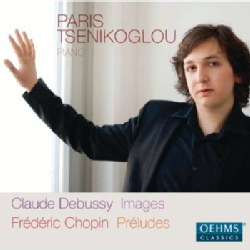The booklet notes accompanying this release evoke images of nature and poetry that wildly contrast with Greek pianist Paris Tsenikoglou’s largely stiff, literal, and unimaginative performances of Debussy’s Images and Chopin’s Op. 28 Préludes. The Chopin begins with a matter-of-fact reading of No. 1 that leads into a plodding No. 2 that might as well have been played to a click track; and forget about anyone bringing out those jarring dissonances.
Other drawbacks include No. 3’s mechanical left-hand arpeggios, No. 24’s constricted dynamics, No. 16’s typewriter-ish phrase shaping (and why a diminuendo in the forte opening bar?), No. 10’s overly loud right-hand runs, a soporific No. 23, and a No. 18 tethered to a metronome and pummeled to death.
The Debussy is a bit better, although not by much. All the notes are securely in place throughout Reflets dans l’eau and Hommage à Rameau, yet Tsenikoglou offers little of the color, nuance, and shimmer with which Michelangeli, Moravec, Aimard, and Bavouzet spoil us. Poissons d’or’s foursquare phrasing allows little of the music’s characterful whimsy to register. At least Tsenikoglou’s sensitive and tonally evocative performances of Et la lune descend sur le temple qui fut and Cloches à travers les feuilles make up for the clunky, enervated, and under-tempo rendition of Mouvement. Pass on this one.
































